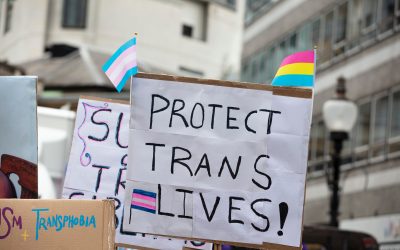

By Mariah Cowsert
August 31, 2023
While Pride month has already wrapped up this Summer, it’s crucial that our support for LGBTQ+ youth and young adults doesn’t waiver as the temperatures cool—especially for transgender young people and adults whose rights are constantly under attack across the United States. Trans youth deserve to not only live without threats to their safety and health care; trans youth—like all young people—deserve to live in a world that affirms and celebrates them for who they are and ensures every young person has the agency, opportunity, and equitable access to make informed decisions about their bodies, relationships, and futures.
While we’ve seen a rise in proposed or enacted legislation popping up across the US to limit access to health care and support for transgender youth and adults—in this post, we want to focus on what’s happening in the state of Maryland and how you can take action to support transgender youth and young adults locally (no matter where you call home). Maryland is now a protected state, offering support and care for transgender adults and youth statewide and beyond our state borders, and we think it’s important to highlight how crucial this new legislation is in the wake of the onslaught of bills that strip bodily autonomy from trans people.
The Trans Health Equity Act, which was signed by Governor Wes Moore this summer, grants LGBTQ+ Marylanders and out-of-state neighbors access to safe and medically necessary care.
Now, let’s dig deeper into the expanded protections for trans youth and young adults in Maryland. The Trans Health Equity Act, which was signed by Governor Wes Moore this summer, grants LGBTQ+ Marylanders and out-of-state neighbors access to safe and medically necessary care. The order also commits to protecting access to gender-affirming care by ensuring that no one who lawfully provides, assists, seeks, or obtains such treatment should be subject to legal liability or professional sanction.
The Trans Health Equity Act will also make gender-affirming care a mandatory part of all Medicaid plans, beginning on January 1, 2024, and highlights that the care must be administered in a nondiscriminatory manner.
The bill includes a definition of gender-affirming care or treatment that is inclusive of hormone therapies, puberty blockers, several types of surgeries and revisions, as well as voice training, fertility preservation, and permanent hair removal. It is important to note that the bill does not change the existing state requirements for access to surgeries, which include one year of supervised hormone therapy and multiple referrals from a therapist or other mental health care provider.
Critically, the research is clear: access to inclusive, gender-affirming care and support from loved ones (whether that be friends or family) can be lifesaving.
Critically, the research is clear: access to inclusive, gender-affirming care and support from loved ones (whether that be friends or family) can be lifesaving.
In a new brief from The AAMC Center for Health Justice, researchers estimate that approximately 300,000 (1.4%) young people, ages 13–17, in the United States are transgender. Social discrimination, stigma, and gender dysphoria harm transgender youth, elevating the risks for anxiety, depression, and suicidal thoughts and attempts. Yet, as research shows, transgender youth who receive gender-affirming care, and support from friends and family, experience improved mental health and quality of life.
If you or someone you know is seeking more information about accessing gender-affirming care in Maryland (whether in state or out-of-state), you can get more information from Trans Maryland and Planned Parenthood of Maryland.
Gender diverse young people can learn more about accessing gender-affirming care from the Chase Brexton GenderJOY program, which provides expert services for adolescents and their families across the state of Maryland or from the University of Maryland Children’s Hospital.
There are also many ways you can start, right now, to help support and affirm transgender youth and young adults in your communities. Fortunately, there are many ways to access and share resources with the trans, non-binary, and gender expansive young people in your life, but I’ll just highlight a few that you can turn to.
I was lucky enough to hear one of Queer Youth Assemble’s founders, Esmee Silverman, speak at the Society for Adolescent Health and Medicine (SAHM) conference this year. Queer Youth Assemble is an incredible nonprofit, created by and for youth, whose mission is to bring joy and autonomy to all queer youth under 25 in the United States and territories. They are home to a wide-variety of resources and supports for both youth themselves and the adults who are looking to support queer young people including educators, parents, guardians, and more.
If you’re an educator, there are ways to connect (or create!) a Gender and Sexuality Alliance (GSA) club in your school or community—P.S. learn more in my post on GSAs. Additionally, you can help LGBTQ+ young people get connected online—this is especially helpful if it may not be safe for the young person to be out yet—through imi which has guides built for and with LGBTQ+ teens to help them explore their identity and support their mental health.
If you’re a parent, guardian, or trusted adult of a trans young person, The Cut just released The Transgender Family Handbook, which includes 144 specific suggestions, from trans young people and their loved ones. The handbook highlights how to support your child’s transition, with topics ranging from having a name-change ceremony, shopping guides on how to buy a binder or bra, navigating school, and even when to consider moving (if you should or are able to) depending on your state.
Even with insurance or Medicaid, gender affirming care—and the time off from work or school to recover, depending on the care someone has received—can be expensive. If you’re able to contribute to a neighbor, friend, or loved ones GoFundMe (or Venmo) to help alleviate the financial aspects of getting care—do it! Every dollar counts; if you can’t contribute financially, consider organizing or participating in a meal train while they’re recovering, helping with housework, and of course, continuing to be a trusted person that they can turn to for support.
Looking for mental health resources for the trans young people in your life? You can check out our mental health support guide that showcases a variety of resources and is inclusive of care and support for LGBTQ+ young people. Whether it is crisis hotlines, tool kits, trainings, or support groups, there are many ways to get youth connected to mental health resources today.
While Maryland has become more of a sanctuary state for LGBTQ+ youth and adults, it’s not the only state working to better support trans, non-binary, and gender expansive young people and adults. Colorado, Illinois, New Mexico, and Minnesota have also passed bills that are designed to support or expand gender-affirming care and legal protections for trans folks. You can find more information about state-by-state breakdowns of gender-affirming care “shield” laws, that’s continuously updated, from the movement advancement project. It’s essential that we stay up to date, as best as we can, with new legislation and continue to show up for trans youth and adults across the United States.
Mariah brings an artistic lens to nonprofit communications in her role as Communications Designer. With the bulk of her experience working in social services and at affordable housing organizations—she has a passion for diving deeper into (and helping bridge the gap between) health care and housing. In her free time, Mariah can be found tending to her growing jungle of houseplants, making collage and textile art, reading Mary Oliver poems in nature, and experimenting with new vegetarian recipes. Read more about Mariah.










